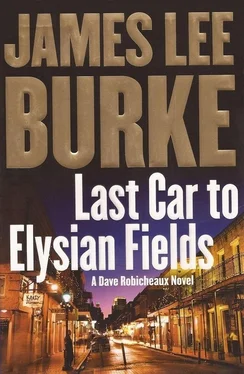“So the truck and bus drivers are off the hook?” he said.
“I don’t think they’re players in this,” I said.
“Excuse me?” the wife said.
“I think your daughter and her friends were served alcohol illegally. I’d like to put the people in jail who empowered them to drink and drive. But to be truthful I don’t think that’s going to happen.”
“Our daughter is responsible for her own death? Is that it? A seventeen-year-old girl burns to death and it’s her goddamn fault?” the father said.
I leaned forward on my desk and picked up a paper clip from the ink blotter, then dropped it. “Dr. Parks, I’m sorry for your loss. Your daughter had a history. It’s one a lot of kids have today. But the fact won’t go away that she’d had her license suspended previously and she was on probation for possession of Ecstacy. Was she ever in any kind of treatment program?”
“How dare you?” the wife said.
“How about it, sir?” I said to her husband.
“You’re scapegoating my daughter, you sonofabitch,” he said.
“We’re done here,” I said. I folded my hands on my desk blotter and avoided eye contact with them.
“We’ll be back,” the father said.
“I have no doubt about that,” I replied.
At mid-morning I walked down the street, across the railroad tracks, and had coffee and a piece of pastry at Lagniappe Too on Main. When I got back to the department a black woman in blue slacks, a beige shirt, and polished black shoes was waiting for me by the dispatcher’s cage.
She carried a zippered satchel under her arm.
What was her name? Andrepont? No, Arceneaux. Clotile Arceneaux.
Clete had said she looked like a black swizzle stick with a cherry stuck on the end. He should have been a writer rather than a chaser of bail skips, I thought.
“Got a minute?” she said.
“For you, anytime,” I said.
She walked with me to my office. I closed the door behind her.
“N.O.P.D. hasn’t busted you back to meter maid, have they?” I said.
“Thought I might show you some photos of an interesting guy who just got to town,” she said.
“You want to tell me who you are?”
She smiled at me with her eyes and removed a manilla folder from her satchel. “You ever see this guy before?” she asked.
There were four black-and-white photographs inside the folder, three taken with a zoom lens, one taken in the garish light of a Toronto booking room. The man in the photographs made me think of a ring attendant at a boxing gym or a horse groom at the track. “Nope, I don’t know him,” I said.
“His name is Max Coll. He’s been questioned or been a suspect in thirty-two homicides. Not one conviction. Interpol thinks he worked for the IRA but they’re not sure. Miami P.D. says he’s freelance and jobs out for the Mob. We had a tail on him yesterday, but he shook it. We think he showed up at your friend Father Dolan’s.”
“Think?” I said.
“A detective talked to Father Dolan. Seems like Father Dolan has got us mixed up with the bad guys,” she said.
“Why you showing me this stuff?”
“Hate to see your friend get clipped ‘cause he’s a poor listener. That goes for you, too, handsome.”
“You’re with the G?”
“We think the priest was lucky yesterday. What we can’t figure is why. Max Coll is a lot of things but fuck-up isn’t one of them,” she said.
“You’re DEA?”
She looked up into my face, her head tilted at an angle, her teeth white behind her grin. “I heard you had a cinder block for a head,” she said.
“Have you had lunch yet?” I said.
“Some people are all work and no play. That’s me, Robicheaux. Max Coll uses a silencer, sometimes an ice pick. You heard it first from your ex-meter maid friend at N.O.P.D.”
“Right,” I said.
She stuck a business card in my shirt pocket and hit me on the hip with her satchel. “See you around, darling’,” she said.
I walked with her to the front door of the building and watched her get in her automobile and drive away. Helen Soileau was standing behind me.
“What’s with Miss Hip-Slick?” she said.
“She’s with N.O.P.D.,” I said.
“The hell she is. She’s a state trooper. She used to work undercover narcotics in Shreveport. She got into a firefight with some dealers about ten years ago and shot all five of them.”
Later, while I was out of the office, Clete Purcel left a message that he had checked into the old motor court on East Main, one that had long served as his field office in southwest Louisiana and his home away from home. The motor court was located inside a massive bower of live oak trees and slash pines on the bayou, and when I drove through the entrance that evening I saw Clete in front of the last cottage, barechested, wearing shorts with dancing elephants on them, flip-flops, and a Marine Corps utility cap, drinking from a bottle of Dixie while he flipped a steak on a naming grill.
“Running down bail skips?” I said.
“No, I just had to get out of the Big Sleazy for a while. Gunner Ardoin is driving me nuts,” he said.
“What’s happening with Gunner?”
“He thinks somebody’s going to clip him. Maybe he’s right. So I...”
“So you what?”
“Gave him my apartment.”
“Your apartment? To Gunner Ardoin?”
“His wife skipped town and left his little girl with him. What was I supposed to do? Quit looking at me like that,” he said. He picked up a can of diet Dr. Pepper from an ice chest and tossed it at me.
I sat down in a canvas chair, out of the smoke from the grill. Through the trees the sunlight looked like gold foil on the bayou. A tugboat passed, its wake slapping against the bank.
“Ever hear of a button man by the name of Max Coll?” I said.
“A freelance guy out of Miami?”
“That’s the one.”
“What about him?”
“That black patrolwoman who answered the complaint in Ardoin’s kitchen, Clotile Arceneaux? She’s an undercover state trooper. She told me this guy Coll tried to kill Father Dolan yesterday,” I said.
“Dolan thinks he walks on water. You might tell him the saints died early deaths.”
“He’s not a listener,” I said.
“Yeah, like somebody else I know,” Clete said.
I walked down in the trees and watched the boats pass on the bayou while Clete finished grilling his steak. On the opposite bank two black laborers were trenching a waterline while a white man in a straw hat supervised them. When I walked back out of the trees Clete was laying out two plates, paper napkins, and knives and forks on a picnic table.
“I don’t want to steal your supper,” I said.
“Don’t worry about it. My doctor says when I die I’ll need a piano crate just to put my cholesterol in,” he said.
“I’m trying to find out what happened to a convict in Angola back in the fifties. A guy named Junior Crudup. He went in and never came out,” I said.
“Yeah?” Clete said, dividing up his steak, looking at a woman in a bathing suit on the bow of a speedboat.
“Father Jimmie and I were at the house of Castille LeJeune Saturday evening. LeJeune got Crudup off the levee gang back in 1951. But he said he has no memory of it,” I said.
“You’re talking about stuff that happened a half century ago?” Clete said.
“Crudup’s family got swindled out of their property.”
Clete plopped a foil-wrapped potato on my plate and sat down. He looked at me for a long time. “So you think this character LeJeune is lying?” he said.
“I couldn’t tell.”
“Wake up, big mon. Rich guys don’t care whether the rest of us believe them or not. That’s why they’re great liars.”
“His daughter saw two kids about to fall into a fish pond. But she was afraid to climb inside a fence and get them,” I said.
Читать дальше












